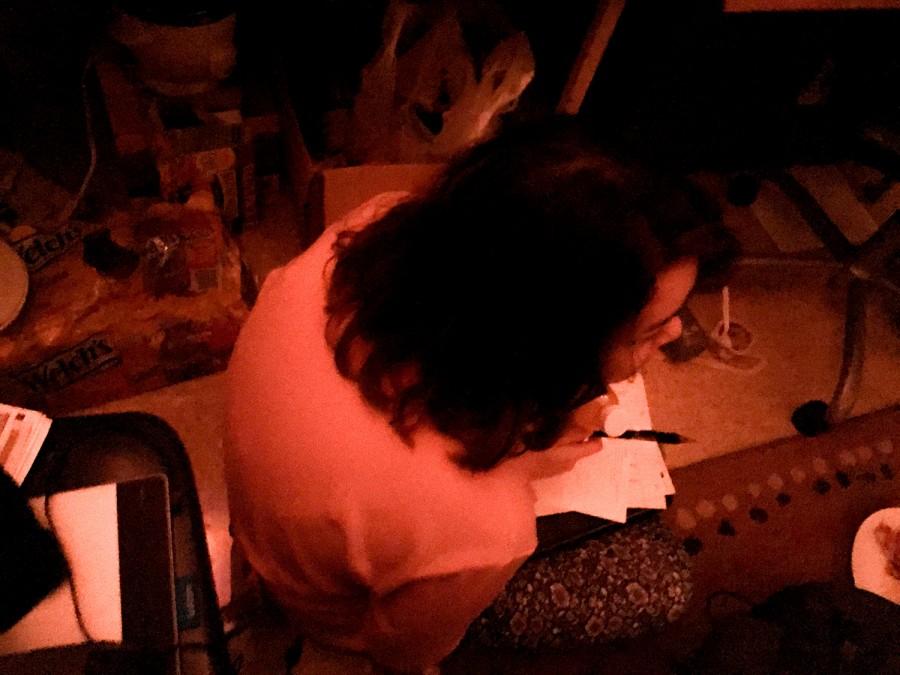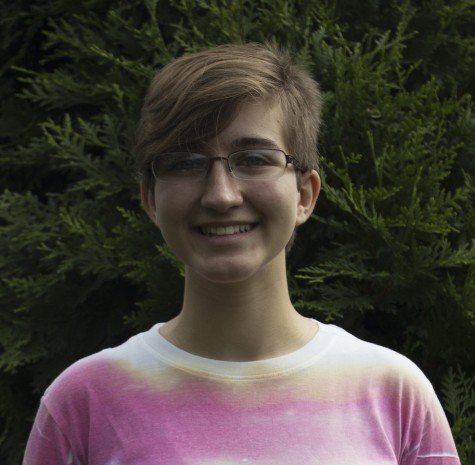Students Worry Over School Shooters, Admin. Responds with Plans
Student Elle McKenzie works on homework during the lockdown on Dec 13. She is lit by Christmas lights as the students didn’t know if their lights should be on.
January 10, 2016
Everytown, a not-for-profit organization advocating gun control, claims that more than 60 guns have been fired on school campuses in 2015 alone. In a count including attacks resulting in injuries and accidents and suicide attempts that resulted in injuries to people besides the shooter, but discounting accidents with no injury, suicide attempts with no injury to anyone but the shooter, and incidents where there was no injury but motive could not be determined,44 incidents were found. The school shooting closest to Columbus was at Delta State University, more than two hours west. One professor was shot and killed on campus.
Recently, the Mississippi School for Mathematics and Science had a modified lockdown as a shooter was reported near campus on Dec 13. In response to this unexpected lockdown, as well as the increasing coverage of school shootings, several students were asked about the level of preparedness they felt in case of such an emergency. While some students, such as Kobe Van Someren, reported feeling safe and secure, several students felt differently. Lauren Hill says that she does not feel prepared for an emergency, saying, “I’d probably panic.” Sara McClendon and Dajah Carter both said that they had no clear idea of what to do during the Dec 13 lockdown, with Carter saying, “When the shots were fired, I was actually asleep but I was woken up by other people in the room freaking out and not knowing what to do.”
When these concerns came to Dr. Germain McConnell, executive director at MSMS, he responded with a clear head and reassuring words. McConnell began by saying, “The most important thing is that faculty and staff know what to do.” Addressing the concerns he said, “If students feel that they don’t feel secure, then that means that we need to take measures there.” However, he made it clear that the faculty and staff know exactly what to do.
Staff’s training, says McConnell, includes “discussions in their department meetings, the actual drills themselves, the information written in the handbooks.” Also, a great benefit to the school is our proximity to the MUW police office: “Your normal [school] districts hire resource officers, and we have an entire department here on this campus, and we are a smaller campus as well. That is a huge benefit. If we need somebody to respond, they’re right here.”
However, McConnell made it clear that he is not willing to let the matter of student safety go lax just because of our pre-existing safety measures. “We can not afford to get too comfortable.” McConnell mentioned the potential of access card readers at the entrances to dorms and academic buildings, to prevent unwelcome outsiders. McConnell worried slightly over the line between making sure students feel free but also safe, saying, “How do you balance something like that?” However, he continued by saying that he didn’t see what the access card readers could hurt as they plan on making the system as convenient as possible. Newly-appointed Technology Coordinator Andy Rhea is looking into those now, McConnell says. If everything goes to plan, McConnell would like to have access card readers by the time students return from spring break. When discussing the possibility of student shooters, McConnell puts the responsibility on the students. He asks that students remain vigilant and take all threats seriously, making use of the anonymous reporting tool [found here]. With precautions such as vigilant students and access card readers, McConnell says that he wants to focus on avoiding potential incidents, saying, “We want to look at preventing something dangerous from happening, not reacting.”
Director of Academic Affairs Kelly Brown also had reassuring words. “We do have several drills planned for this semester that I hope will help students feel more comfortable,” said Brown. She also gave a brief explanation for students in a lockdown situation, “All students need to get to a safe, secure spot away from view. Respond quickly to teachers or staff members who are in charge. Stay quiet and as calm as possible.”
Still, many students have mentioned that detailed explanations of what to do would go a long way for their safety of mind. McClendon said that she would like to see, “a discussion in each building we have classes in, including the Residence Halls, about what we are to do and where we are to go.” Brenna Paola gave a similar response, saying, “Even giving a seminar during orientation would help most students know what to do. There are pieces of paper attached to the back of the dorm room doors describing what to do in a fire. Papers with other protocols could be attached to the doors so that students can see exactly what needs to happen during times they are away from adults who know the procedures.
“Also, we communicate through emails. There could be a file with instructions for each emergency emailed to students when situations do occur, especially with the poor quality of the intercom,” Paola said.
Jenny Nguyen wishes that lockdown drills happened immediately upon seniors and juniors arriving at the beginning of the year. However, she also praised the immediate and concise actions of the Residence Hall during the Dec. 13 lockdown. Even if the students were lost on what to do, the Residence Hall Staff kept the students safe.









